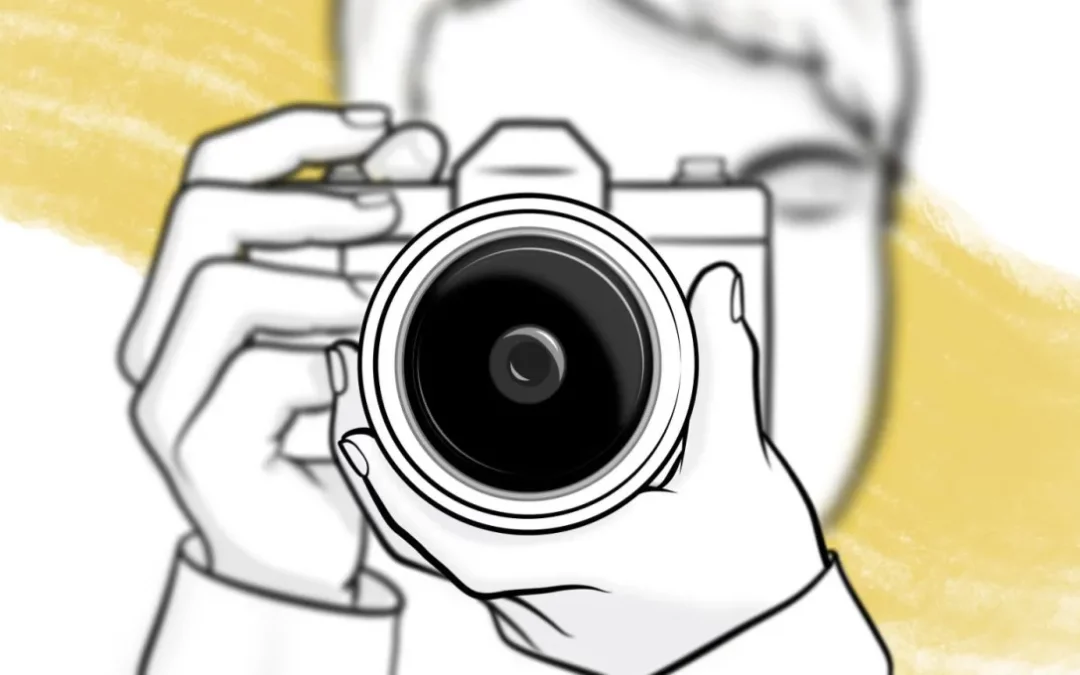The jury of Lova Photo Competition 2020 consisting of organizer and chair Mara Lin Visser, and members Laisa Maria, Julia Chanda Zvobgo, and Claire Bontje, presented their report on 2 July 2020. This round’s theme of the competition was Gender in turbulent times. The jury wrote the following:
“The collection of submissions for Lova’s Photo Competition 2020 inspired a long deliberation of almost three hours and a lot of discussions and reflections. This is a testament to the range of creative, thoughtful, and varied submissions that touched on Gender in Turbulent Times.
Tina Krüger is the Jury Award winner. Tina’s photo and text illustrate (in this local context) how even in turbulent times and with the notion of “women and children first” women with children are in a less advantageous position. The photo contains different layers and lines that pull the viewer in. The entire framing and composition tell the story.
Alessandro Belleli‘s photo “Father looking for” ‘ticked all of the boxes’, both technically and story-wise. The shot is original and engaging. The accompanying autoethnographic description also highlights a male perspective on parenthood which is often invisible.
Andre Malaya M. Ragragio‘s photo and text reflect on the impact of gender across generations. The emotion captured drew us in and this raw, beautiful moment gives the viewer a sense of being there.
Irma Beusink ’s photo “Our rivers, are our roads”. Whether intentional or not we found it interesting how visually the woman takes a lot of the space while the man appears almost above her or on top of the pyramid. This echoes issues raised in the text. The text stood out amongst all of the submissions as it highlighted essential ethical considerations.
Luisa Machacon perfectly depicts how even in times of uncertainty everyday rituals continue. The composition of the image centers the subject whom we want to know more about and their story.”
Below we present the pictures with the description the submitters provided. On the Lova Facebook page of the period between 14 April and 2 July 2020 all pictures received are shown. A report of the competition was published in Lova Journal #41
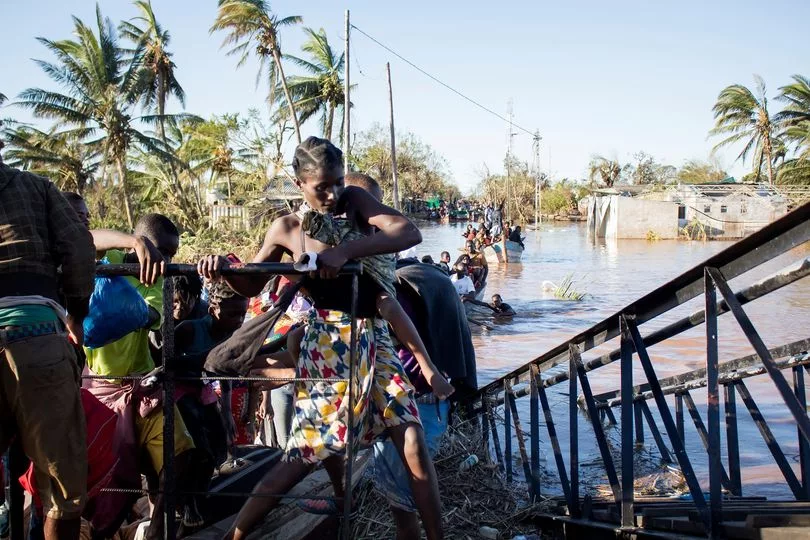
Woman with baby scrambling to get to the dock in Buzi after storm of 14 March 2019 in Mozambique. Photo by Tina Krüger
Cyclone Idai made landfall near Beira city in central Mozambique on the night of March 14th 2019, bringing with it torrential rainfalls and winds with gusts of up to 280 km/h, leaving about 90% of the city and its surrounding areas destroyed and flooded. It is considered the second deadliest tropical cyclone on record in the southern hemisphere and it has caused a humanitarian crisis in the region.
The photo was shot in Buzi, one of the hardest-hit areas around Beira. Access by land was completely cut off due to the flooding. In Buzi a total of 12,280 people were affected by the cyclone. With only one accommodation center to provide shelter, many people slept on roofs for days on end without any food.
The photo shows a woman with her baby scrambling to get to the dock where Indian Navy rescue boats are waiting to evacuate. Many women were carrying babies and small infants with them, adding another layer of stress onto their already dire situation. Although the premise was “women and children first” there was still a frenzy since everyone was anxious to get back to land and the boats had very limited capacity. Often the women with infants weren’t able to push through the masses as easily as their male counterparts.
The Indian navy started boat rescue missions to Buzi and surrounding islands on March 20th. During this mission on the 21st of March, 7 days after the storm, a total of 64 people were rescued, 24 of them children.
wwwxxxtube.comwwwxxxtube.comTina Krüger, born in 1988 in Germany, is a photographer, multimedia artist, documentary filmmaker, visual anthropologist, and graphic designer with an MA degree in Visual Anthropology. Since 2008 she lives and works in Maputo, Mozambique.
In her work, she is interested in topics around identity, corporeality, sensory knowledge, feminism, unusual perspectives of everyday life, environmental issues, and the intersection between anthropology and art.
She is the co-founder of the creative production company Aguacheiro Design & Multimédia, where she works as director, cinematographer, producer, sound, editor, photographer, and communication consultant since 2013. For two years (2017-2018) she was a lecturer in the BA Film and Multimedia program at the Arts and Culture University in Maputo. She is the director and co-founder of emptyroom.art, a creative and arts hub in Maputo.
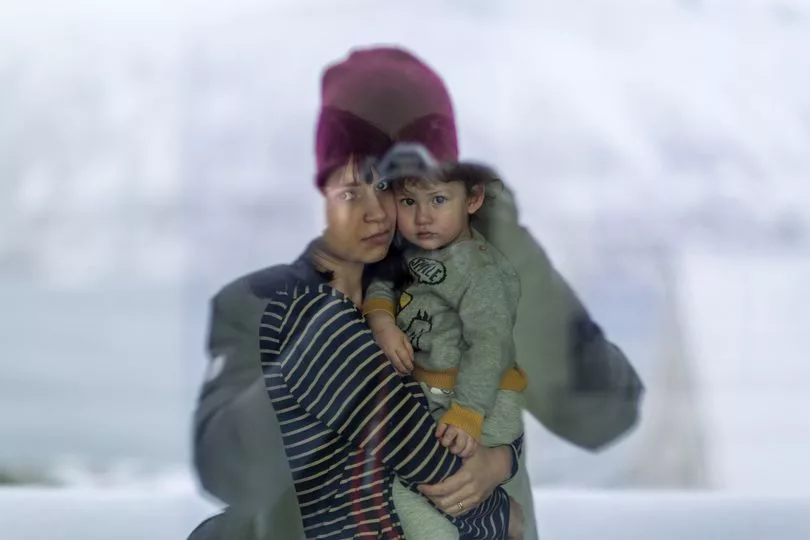
‘Father looking for’, in series ‘Life under Covid-19 in Arctic Norway, May 2020, Tromsø. Photo by Alessandro Belleli
I am reflecting on how it is like to be a caring father in the times of corona and the climate worries and feel the weight of the responsibility that our generation carries toward the younger ones. I want to explore new ways of living, rethink my models and values, the masculine in 2020. I feel that the archetypical Alpine Italian man, many of his characteristics are outdated.
Born in Trentino (Italy) in March 1983, Alessandro Belleli is an arctic anthropologist, photographer and filmmaker with a big weak side: a profound and systematic attraction towards the South. Coming from a middle ground, an area in between cultures, he has always been (in his opinion luckily) divided and therefore attracted by two opposite directions: the geographic, cultural and above all, temperamental North and South. As an anthropologist photographer and filmmaker, he has been working in Denmark, Western Greenland, Brazil and Northern Norway. His works have been shown and published on the National Italian TV RAI, the National Norwegian TV NRK and by the Italian Polar Institute.
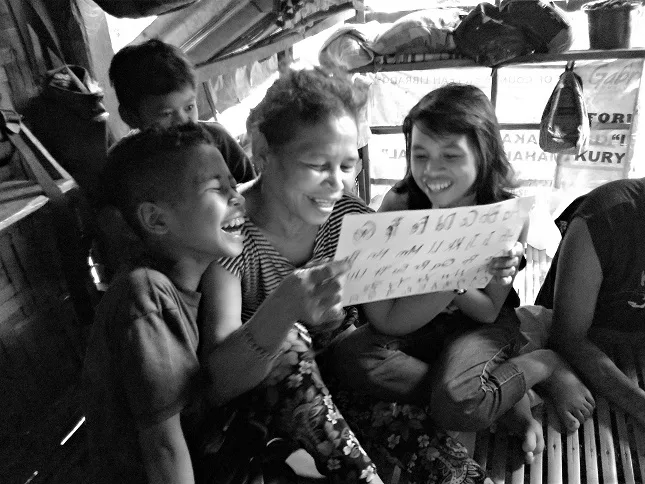
Grandmother learning alphabet with the help of grandchildren in a camp in the Philippines. Photo by Andre Malaya M. Ragragia
Kanua Andil laughs as she is taught by her youngest son (left) and granddaughter (right) how to read the alphabet in a bakwit, or evacuation center in Davao City, Philippines. Many Pantaron Manobo of her generation, especially women, remain unable to read or write. With the help of city-based support groups, they had established their own community schools in the Pantaron Mountain Range so that their children and grandchildren might receive a formal education, but their schools have been vilified as communist fronts and they have since been forced to flee because of counter-insurgency operations.
During my fieldwork in the bakwit from 2018 to 2019, many women told me that in their youth, they had hoped to go to school themselves. But wariness of non-Manobo people and cultural expectations to marry early prevented such wishes from being realized. This is why, in spite of rudimentary facilities and a government order to close their school down, they strive to continue classes in the bakwit. This has helped reduce early marriages, and girls and boys now aspire to reach university and become teachers and doctors.
I remember this scene well because, even though Kanua – like many women her age – is typically reserved in showing spontaneous emotion, here she was relaxed and amused at her own efforts to read. There was no sense of embarrassment whatsoever at her awkward pronunciation of the letters, or the fact that it was the young ones who were teaching their elder; it was one of those scenes where you can genuinely say that they were all laughing with each other, and not at one person’s unfortunate circumstance of being illiterate. This photo for me stands for a moment of enjoyment and respite from the physically and emotionally taxing life in the bakwit, an image of intergenerational closeness, and of achieving a dream together in the midst of turbulent times.
The jury of the competition wrote about this picture: “Andre Malaya M. Ragragio‘s photo and text reflect on the impact of gender across generations. The emotion captured drew us in and this raw, beautiful moment gives the viewer a sense of being there.”
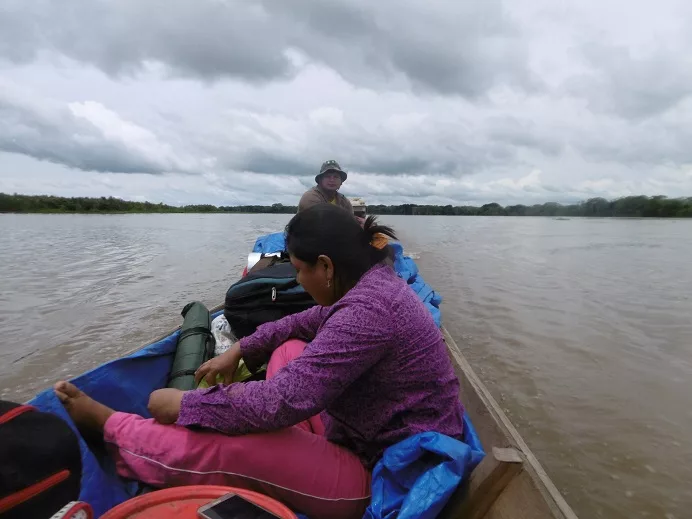
Our rivers are our roads. Photo by Irma Beusink
In February 2017 we travelled with indigenous authorities into their indigenous territory Isiboro Securé by boat. These organisations have protested the a planned high way through their territory because of the expected environmental consequences due to deforestation. Besides the road would not benefit them as they use to travel by boat on the many rivers. At the moment of the travel, the territory started to be flooded because of high rainfall upstream. Indigenous women play an important role in the protest against the highway but men are still in charge of the boat. We travelled about five days with five adults and we returned because we did not want to bother people living in moments of disaster.
The jury of the competition wrote about this picture: “Irma Beusink’s photo ‘Our rivers, are our roads’. Whether intentional or not we found it interesting how visually the woman takes a lot of the space while the man appears almost above her or on top of the pyramid. This echoes issues raised in the text. The text stood out amongst all of the submissions as it highlighted essential ethical considerations.”
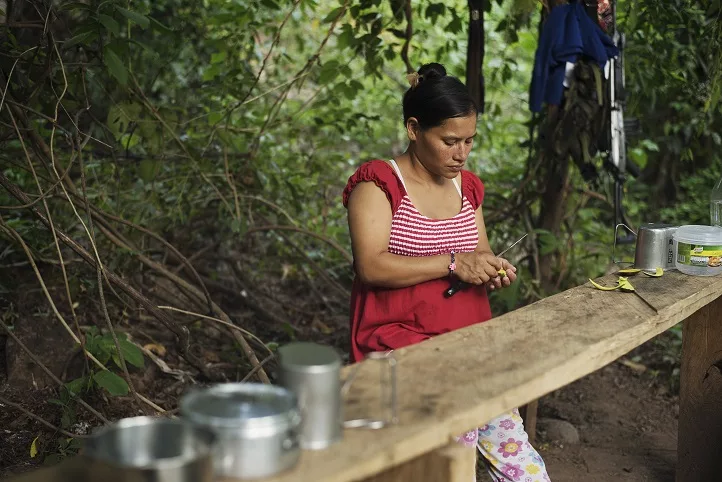
Ex-FARC member for return to civil live in Colombia. Photo by Luisa Machacón
Colombia was in an internal war, between the ex-guerrilla group FARC-EP and the government, for more than 50 years. By the end of 2016, after four years of negotiation with the Colombian Government, an agreement between the two parties was signed and more than 6,900 soldiers from the ex-guerrilla group started their transition to civil life. By June 27, 2017, the FARC – EP soldiers delivered 100% of their guns to the United Nations. Many members of the group asked themselves, “what is the next step in life?”
The image shows an ex-FARC female member waiting to be able to go back to civil life. The picture was taken in 2017, at the Transitional Local Zone, Pondores. By the year 2020 the most of the proposals made in the agreement have not been implemented, creating this distrust within the two parties (government and ex-FARC group) and a big state of unrest in the country.
In the jury report of the competition this picture was presented with the following words: “Luisa Machacón perfectly depicts how even in times of uncertainty everyday rituals continue. The composition of the image centers the subject whom we want to know more about and their story.”
